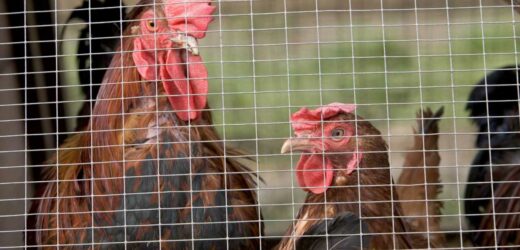HEALTH chiefs are tracking new cases of bird flu "very carefully" after two Brits tested positive for the first time in over a year.
The workers, from a poultry farm in England, were found to have contracted the bug during routine screening.
Neither suffered symptoms of infection and there are no signs of human-to-human transmission, the UK Health Security Agency (UKSA) has said.
However, officials are monitoring the situation and running a programme of testing workers who deal with birds infected with avian flu.
UKSA chief medical advisor Professor Susan Hopkins told BBC Radio 4's Today programme: "Clearly this is an ongoing risk that we need to monitor and watch for very carefully and understand how transmission may occur."
She confirmed both cases have now tested negative on PCR swabs, and that it remains uncertain whether they were "a true infection", which occurs when the virus sits in the nose.
READ MORE HEALTH NEWS
Bird flu alert as two cases detected in poultry workers in England
I’m a dietitian – here are 7 foods you should NEVER eat past their ‘use-by’
Professor Hopkins added: "These are people who are working in very close contact and proximity with infected birds on infected farms, so there will be a lot of dust and a lot of potential virus fragments in the air, but also on the ground, on their clothing as they’re working in this environment.
"They wear a lot of PPE to prevent them from getting infected, but there is always still a risk that this virus and the contaminants from the environment can get under the nose and therefore we can detect bird flu when we do swabs from that.
"We are testing the contacts of individuals and we are offering tests.
"We will continue to do that as part of our surveillance."
Most read in Health
Surprising practice that 'can help you shed the pounds' – and fast
Bird flu alert as two cases detected in poultry workers in England
My daughter's head has TRIPLED in size – evil trolls taunt her
I loved the sun – I’m sharing these awful photos so you wear sunscreen
The first human case reported was detected with a swab put in the nose.
Experts believe it is likely this worker may have inhaled the virus.
The second case is thought to be more complicated and it is unclear whether the person has suffered a genuine infection or whether they have inhaled the virus at work.
Further investigation is underway, but precautionary contact tracing has been undertaken for this person, the UKHSA said.
Both people are now testing negative, the agency said, adding there is no evidence of person-to-person transmission.
The UKHSA said the cases do not change the level of risk to human health, which remains "very low to the general population".
Professor Hopkins said: "Current evidence suggests that the avian influenza viruses we're seeing circulating in birds around the world do not spread easily to people.
"However, we know already that the virus can spread to people following close contact with infected birds and this is why, through screening programmes like this one, we are monitoring people who have been exposed to learn more about this risk.
"Globally, there is no evidence of spread of this strain from person to person, but we know that viruses evolve all the time and we remain vigilant for any evidence of changing risk to the population.
"It remains critical that people avoid touching sick or dead birds and that they follow the Defra advice about reporting."
'CRITICAL' WARNING
Bird flu is a well-known infectious disease of poultry and wild birds.
Other animals have also been catching the illness, such as seals, otters, wild dogs and foxes.
Animal cases have been reported in the UK and across the world.
The H5N1 virus is the most prevalent strain in circulation at the moment.
The UKHSA said people with the highest risk of exposure to infected birds are contacted daily to monitor for the development of any symptoms.
In the asymptomatic surveillance programme run by the UKHSA, poultry workers are asked to swab their nose and throat to check for flu during the 10 days after exposure.
In some cases they may also be asked to have finger prick blood tests to see if antibodies against avian flu are picked up.
Read More on The Sun
Vet nurse reveals the best dogs for first time owners & those to AVOID
I took a cheeky week-long break in Spain without using annual leave – here’s how
Anyone in contact with a person with bird flu may also be tested.
They may be offered antiviral drugs to protect themselves from infection and lessen the chance of passing it on.
Everything you need to know about bird flu
What is bird flu?
Bird flu is a disease of birds caused by influenza viruses.
What strain of bird flu has been circulating?
A Eurasian strain of H5N1 highly pathogenic avian influenza has been circulating in the UK and Europe.
This strain is a very strong and infectious virus to poultry and other birds, but the risk to human health is considered very low.
What are the signs of bird flu?
Symptoms in birds who are infected with the most serious strain include swollen head, closed and runny eyes, lethargy and depression, lying down and unresponsiveness, lack of co-ordination, eating less than usual and a sudden increase or decrease in water consumption.
Some species such as ducks, geese and swans can carry the avian influenza virus and spread it without showing any signs of illness.
Birds infected with the less serious strain of bird flu, called low pathogenic avian influenza (LPAI), may not show clear signs of infection. They may have mild breathing problems. These signs can indicate bird flu, but the avian influenza virus can only be confirmed through laboratory tests.
Is bird flu a risk to humans?
The advice from the UK Health Security Agency (UKHSA) is that the risk to public health from the virus is very low. People are advised not to touch or pick up any dead or visibly sick birds that they find.
The UKHSA said it has not detected evidence of human-to-human transmission and that the two newly-announced detections do not change the level of risk to human health, which remains very low to the general population.
What measures have been in place?
A "mandatory housing order" for England and Wales was lifted on April 18, meaning poultry and captive birds could be kept outside again.
Bird keepers had been subject to a national housing order since November 7 to help curb an unprecedented number of bird flu cases – more than 330 had been confirmed in the UK since October 2021.
The Government said poultry and other captive birds could be kept outside again unless they were in a specified protection zone.
Is the virus still circulating in the environment?
In April, Dr Christine Middlemiss, the UK's chief veterinary officer, said the risk of bird flu infection had reduced following restrictive measures throughout the winter, although bird keepers were encouraged to observe "stringent standards of biosecurity".
The Department for Environment, Food and Rural Affairs (Defra) said the strict rules brought in under the avian influenza prevention zone will still apply, as the virus may still be circulating in the environment for several more weeks.
Places with poor biosecurity had been assessed as medium risk of infection and those with good biosecurity are seen as low risk.
Source: Read Full Article










